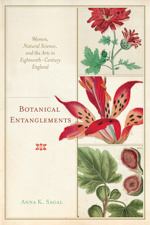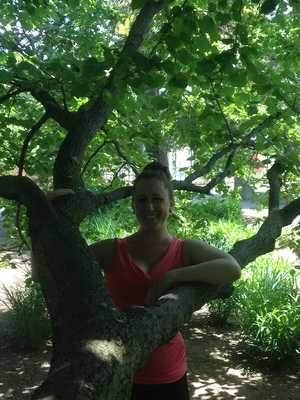Today, we are happy to bring you our conversation with Anna K. Sagal, author of BOTANICAL ENTANGLEMENTS: Women, Natural Science, and the Arts in Eighteenth-Century England
What inspired you to write this book?
A small seed of this book comes from my dissertation, but the central arguments, texts, and methodologies of the book grew from extensive archival research and visits to various botanical gardens. I grew up in a fairly rural town in New Jersey, so I’ve always been interested in the fields, the woods, and the wild plants within. But it never occurred to me until reading work by Priscilla Wakefield that I could look for a scholarly argument in the intersections of literature and nature. There is something so compelling about reading the letters and literature of women from 250+ years ago and seeing in those words the same curiosity and fascination with plant life.
What did you learn and what are you hoping readers will learn from your book?
As an author, I learned that plants are tricky things to write about. They inspire us but they also beguile us, and I found myself more than once struggling with the “right” way to write about the relationships between women and plants. As a scholar, I learned just how deeply and extensively women were involved in botanical and naturalist discourses of the eighteenth-century, which is something I was delighted by but also somewhat surprised to learn. I hope my readers are also excited to see these connections. There has been a lot of really excellent writing on women’s involvement in scientific discourses of the period, but the incorporation of critical plant theory and some more emotional or personal aspects of naturalist endeavors are rare.
What surprised you the most in the process of writing your book?
I was most surprised by how invigorating and inspiring the project has been. After years of city living, it reignited my love for the wild places. I was fortunate enough to be able to travel to several botanical libraries over the course of writing this book—both to use their repositories and to roam the gardens—and those trips kept me consistently excited about this project. I’d be reminded of elements of the book when I saw a flowerpot on a windowsill, and feel a deep connection to the women of the book when I held blossoms or leaves in my hands. Because of this, I never grew tired of or frustrated with the book, even when it needed the most work.
What’s your favorite anecdote from your book?
Of the authors and artists in this project, we have the most personal insight with Mary Delany because of her extensive personal correspondence. So as much as I’d love to say that something exciting or daring from Eliza Haywood’s life is my favorite, I think I’d say Mary Delany’s descriptions of men she doesn’t like are the best. She’s so polite but so scathing.
What’s next?
I’ve been fortunate enough to find a home at Cornell College in a department that really blends literary studies and creative projects together; we’re all involved in both to one degree or another. So, my next project is definitely still about botany in eighteenth-century (& possibly nineteenth-century) texts, but this time I’m thinking about the more explicit linkages between plant bodies and human sexuality, the kind we see in erotica or pornography. I’m also hoping to expand the more artistic aspects of this and bring more poetic elements to the project.





